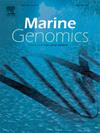对耐盐异翼菌SM2308的基因组分析揭示了其参与褐藻糖聚糖降解的潜力。
IF 1.5
4区 生物学
Q4 GENETICS & HEREDITY
引用次数: 0
摘要
海洋细菌在海藻多糖的降解和循环利用中起着重要作用。然而,参与岩藻聚糖降解的海洋细菌及其降解途径仍然知之甚少。本文报道了从黄海潮间带褐藻样品中分离到的耐盐异翼藻SM2308的全基因组序列。菌株SM2308基因组由一条长4,011,455 bp的单圆形染色体组成,GC含量高达72.70%。菌株SM2308以褐藻聚糖为唯一碳源生长迅速,表明其具有降解褐藻聚糖的能力。基因注释和代谢途径分析表明,菌株SM2308具有完整的岩藻聚糖利用途径,包括通过岩藻聚糖酶将聚合岩藻聚糖胞外分解为更小的岩藻聚糖/焦块,通过ABC转运体将岩藻聚糖/焦块跨膜转运到细胞质中,以及通过非磷酸化途径将细胞内焦块分解代谢。这代表了微球菌目放线菌中第一个具有岩藻胶降解能力的基因组。Isoptericola halotolerans SM2308的基因组揭示了放线菌在海洋生态系统岩藻聚糖生物地球化学循环中的作用。本文章由计算机程序翻译,如有差异,请以英文原文为准。
Genomic analysis of Isoptericola halotolerans SM2308 reveals its potential involved in fucoidan degradation
Marine bacteria play important roles in the degradation and recycling of algal polysaccharides. However, the marine bacteria involved in fucoidan degradation and their degradation pathways remain poorly understood. Here, we report the complete genome sequence of Isoptericola halotolerans SM2308, isolated from a brown algal sample collected from an intertidal zone of the Yellow Sea in China. The genome of strain SM2308 consists of a single circular chromosome of 4,011,455 bp with a high GC content of 72.70 %. Strain SM2308 exhibited rapid growth on fucoidan as the sole carbon source, indicating its capacity to degrade fucoidan. Gene annotation and metabolic pathway analyses showed that strain SM2308 possesses a complete pathway for utilizing fucoidan, including the extracellular breakdown of polymeric fucoidan into smaller fucooligosaccharides/fucose by fucoidanases, the transmembrane transport of fucooligosaccharides/fucose into the cytoplasm by an ABC transporter, and the intracellular fucose catabolism via a non-phosphorylative pathway. This represents the first genome of an actinobacterium from the order Micrococcales with fucoidan-degrading ability. The genome of Isoptericola halotolerans SM2308 provides insights into the role of actinobacteria in the biogeochemical cycling of fucoidan in marine ecosystems.
求助全文
通过发布文献求助,成功后即可免费获取论文全文。
去求助
来源期刊

Marine genomics
生物-遗传学
CiteScore
3.60
自引率
5.30%
发文量
50
审稿时长
29 days
期刊介绍:
The journal publishes papers on all functional and evolutionary aspects of genes, chromatin, chromosomes and (meta)genomes of marine (and freshwater) organisms. It deals with new genome-enabled insights into the broader framework of environmental science. Topics within the scope of this journal include:
• Population genomics and ecology
• Evolutionary and developmental genomics
• Comparative genomics
• Metagenomics
• Environmental genomics
• Systems biology
More specific topics include: geographic and phylogenomic characterization of aquatic organisms, metabolic capacities and pathways of organisms and communities, biogeochemical cycles, genomics and integrative approaches applied to microbial ecology including (meta)transcriptomics and (meta)proteomics, tracking of infectious diseases, environmental stress, global climate change and ecosystem modelling.
 求助内容:
求助内容: 应助结果提醒方式:
应助结果提醒方式:


